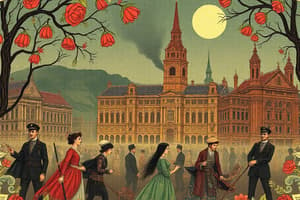Podcast
Questions and Answers
What sparked the hostilities in World War I?
What sparked the hostilities in World War I?
- The assassination of Archduke Franz Ferdinand (correct)
- The migration of people from Eastern Europe
- The emergence of new superpowers
- The Treaty of Versailles
Which of the following was a consequence of World War I?
Which of the following was a consequence of World War I?
- Shift in economic power towards Germany
- Strengthening of the Ottoman Empire
- Formation of the United Nations
- Invention of chemical weapons (correct)
Which empires came to an end as a result of World War I?
Which empires came to an end as a result of World War I?
- Russian, Italian, Japanese, Chinese
- British, Spanish, Dutch, Portuguese
- German, British, French, Ottoman
- German, Austro-Hungarian, Russian, Ottoman (correct)
Which new nations emerged as a result of World War I?
Which new nations emerged as a result of World War I?
What marked the ending of World War I?
What marked the ending of World War I?
What was a significant consequence of World War II in terms of human losses?
What was a significant consequence of World War II in terms of human losses?
In World War II, which country emerged as a new superpower after the war?
In World War II, which country emerged as a new superpower after the war?
What major shift in global power occurred at the end of World War II?
What major shift in global power occurred at the end of World War II?
Which event motivated the creation of the United Nations (UN)?
Which event motivated the creation of the United Nations (UN)?
What tragic event occurred during World War II involving approximately 6 million Jews?
What tragic event occurred during World War II involving approximately 6 million Jews?
Which major development arose from the aftermath of World War II and led to a decades-long rivalry?
Which major development arose from the aftermath of World War II and led to a decades-long rivalry?
What was a common policy adopted by nations after World Wars I and II to prevent future conflicts?
What was a common policy adopted by nations after World Wars I and II to prevent future conflicts?
Flashcards are hidden until you start studying
Study Notes
World Wars and Their Impact on History
The two World Wars marked a pivotal moment in human history, shaping global politics, economies, and societies for generations to come. This article delves into the events, consequences, and lasting legacies of these conflicts.
World War I (1914-1918)
The first global conflict, World War I, began as a regional conflict in Europe, rapidly transforming into a multi-front war involving numerous countries. The assassination of Archduke Franz Ferdinand of Austria-Hungary in 1914 sparked the hostilities. The war ended with the Treaty of Versailles, which imposed heavy penalties on Germany, including military restrictions and territorial losses.
The consequences of World War I were far-reaching:
- Change in empires: The war brought an end to the German, Austro-Hungarian, Russian, and Ottoman empires. New nations emerged, such as Poland, Czechoslovakia, and Yugoslavia.
- The Great Migration: The war led to the migration of millions of people, particularly from Eastern Europe, who fled to Western Europe, North America, and South America.
- Shift in economic power: Despite the devastation of conflict, the United States and the Soviet Union emerged as new superpowers.
- Invention of chemical weapons: Both sides used poison gas, introducing a new era of chemical warfare.
World War II (1939-1945)
World War II, larger in scale and more destructive than its predecessor, began as a continuation of territorial disputes from World War I. Adolf Hitler's rise to power in Germany and aggression in Europe and Asia triggered the conflict. The war ended with the surrender of Germany and Japan.
The consequences of World War II were more profound than those of the first war:
- Human losses: The war resulted in the death of 50 to 85 million soldiers and civilians, making it one of the deadliest conflicts in history.
- Shift in global power: The war ended with the United States and the Soviet Union emerging as the two dominant superpowers.
- Creation of the United Nations (UN): The war motivated the creation of the UN, providing a platform for cooperation among nations and promoting peacekeeping efforts.
- The Holocaust: The war saw the systematic murder of approximately 6 million Jews by the Nazi regime, a tragedy that continues to shape the Jewish community and global memory.
- The atomic age and the Cold War: The war led to the development of nuclear weapons and the ensuing Cold War, which lasted until the early 1990s.
Both World Wars left an indelible mark on history, serving as a reminder of the horrors of conflict and the potential for cooperation among nations. The wars also sparked the rise of new political ideologies, such as fascism and communism, and led to the creation of new international organizations, such as the UN, aimed at promoting peace and cooperation.
In the aftermath of the World Wars, many nations adopted policies aimed at preventing future conflicts, such as the United Nations Charter, the North Atlantic Treaty Organization (NATO), and the European Union. Despite these efforts, conflicts continue to occur, and the historic lessons learned during World War I and World War II remain relevant today.
Studying That Suits You
Use AI to generate personalized quizzes and flashcards to suit your learning preferences.




